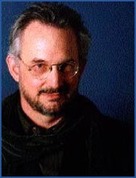
I first met John Young at the Ivy Club, the oldest eating club at Princeton University, which F. Scott Fitzgerald once described as "detached and breathlessly aristocratic," and it is still considered most elite and patrician eating club at Princeton. I was a junior in high school at the time, visiting my brother Mike, getting my first up close exposure to the Ivy League experience. We were all up in the lounge after dinner, watching The Appaloosa with Marlin Brando and John Saxon on television. For me, John’s first memorable quote was to my brother: “Nice zit, Barry.” He seemed so strong, witty, brooding and powerful at the time. Kind of intimidating.
Little did I know at the time that years later I would move to Hollywood after my graduation from Amherst College, and that John would be one of my first mentors in the trade of screenwriting. I’m not sure I was up to the task at the time, so self-absorbed was I in the myopia of my own projects that I could not hear, or listen to, the messages spoken between the lines of John’s feedback for my very early screenplay attempts. I was too young, immature and egotistical to get the heart of his message. I remain grateful for his lending me his writing office in Beverly Hills in those early years, while he was ensconced at his office on the lot at Burbank Studios (now known as the Warner Bros. Studios).
John’s core message was simple and I dare say redundant. It was voiced in a number of settings during our informal discussions as my neighbor, my first residence in Hollywood – where I first moved into the servant’s quarters of a larger house near his home in the Hollywood Hills looking across Cahuenga Pass to the Hollywood sign. His theme and concern was about the critical importance of life experience, and what he saw as the lack of it with the growing hordes of aspiring young writers coming to Hollywood to sell their ideas. Creator of the successful television including China Beach, and Emmy-nominated Executive Producer of West Wing, from the beginning of John’s life in Los Angeles, he sought ways to attain a richer life experience. One case in point, like famed novelist Joseph Waumbaugh, he sought to enlist as a member of the L.A.P.D., so that he could live some of the stories that for so many Hollywood writers were the product of imagination. They turned him down, especially because of the Waumbaugh model, where he had been with the Los Angeles Police Department for years, and later wrote a succession of novels with LAPD officers as the protagonists. The department suspected he was signing up to later have grist for stories. But the drive that took John there is the thing he exemplified.
The theme of the Vietnam War was profoundly resonant for John as well. While to the viewing public they would be familiar with China Beach, and his work on Rumor of War, my brother shared with me a poignant story about John during the Vietnam War. His closest cousin from New Jersey – where John is also from – spent time with John in Los Angeles before deploying to Vietnam. The cousin never returned. And that sense loss at such a young age only deepened John’s life experience and intimately honed his personal perspective on the human condition.
One can’t compete with their life experiences. Each life path is uniquely its own, but John’s story influenced me to seek more of a direct engagement with the challenges and opportunities of life. One instance was while researching a screenplay (and later a novel) I traveled to Guatemala during the time of the death squads, and heard the gunfire in the streets first hand. I studied karate for decades and competed in tournaments. Another was joining the Hole in the Wall Gang in Wyoming, where we rode ranch horses, and drove cattle, and where I was once in the high country, alone, and thrown off a horse, cracked three ribs, and had to get myself back to camp on my own. And beyond those challenges of testosterone, I’ve experienced the pain of divorce, the panic of poverty, the lure of control substances, the fear and survival of of cancer, the exhilaration of recognition in my writing, and the scorn of snubbing dismissal of my writing by industry elites, the passion of new love, the joy and responsibility of fathering two children, the betrayal of trusted friends, the challenge of forging a completely new career in life, the long-term commitment of being a corporate professional, the excitement of new horizons in world travel, and so much more.
I credit John with placing that seed of integrating a demand for plus ultra (more beyond) into my personal code, and assuring that continually seeking new life experiences is critical for the writer, and the promise of a rewarding life path.
 RSS Feed
RSS Feed
